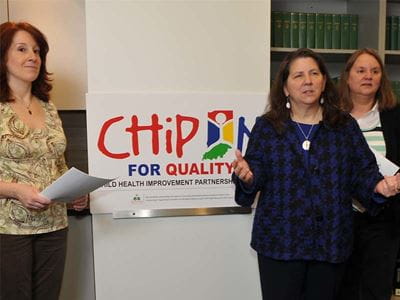By: Nancy Swigonski, MD, MPH, MBA, FAAP
Professor, Department of Pediatrics, Indiana University School of Medicine
Professor, Fairbanks School of Public Health
What do you say to a parent when you know the optimal age of diagnosis for autism is 1 ½ – 3 years old and their child has just been diagnosed at the age of 8? What do you say when you know that early diagnosis and intervention for these children can make a significant difference in their behavior, educational progression and eventual ability to live or work independently? What do you say when seeing a specialist requires a 6 month wait and long-distance travel?
These are the kinds of questions that motivated a group of pediatrics specialists at Indiana University School of Medicine to spend a year analyzing the pressing needs of this patient population, developing solutions and then implementing them. One in every 88 children in Indiana are diagnosed with autism with an average age of diagnosis of 5.3 years. Something had to be done.
The initial project team all volunteered their time. They came from a broad range of expertise including child development physicians, nurses, primary care doctors, psychologists, social workers, government agencies, family organizations and community partners. They realized that meeting the needs of Indiana’s children would require a major change in the model of health care. Key changes and improvements were identified to help better serve this population. The number and knowledge of providers in Indiana had to be increased to provide quality care closer to home. Training and resources were needed at the local level for both providers and for parents. Communication between specialists and primary care providers had to be improved. Patients had to be seen in a timely manner. Support and resources had to be established. Insurers had to be brought onboard to help build and fund a new model of care. This would be a major undertaking.
The Children’s Health Improvement Partnership of Indiana (CHIP IN), a quality improvement project managed by IU School of Medicine’s Center for Children’s Health Services Research, brought together key partners to make it happen. In 2012, CHIP IN, the Indiana State Department of Health and Riley Children’s Foundation opened the first Early Evaluation Center in southern Indiana. In its first year of operation, the average age of diagnoses dropped from 5 to 2 ½ years old. The results were highly encouraging.
Today, the program has expanded with a large number of partners who support Early Evaluation Centers throughout the state, allowing for diagnostic service for children 18-42 months of age in local communities. Centers are now located in Bloomington, Evansville, Lafayette, New Albany, South Bend, Fort Wayne, Muncie, Terre Haute, Anderson, Batesville and Indianapolis. Faculty in IU School of Medicine Division of General and Community Pediatrics and CHIP IN provide practice support, a quality improvement learning community, medical direction and other services to each of these evaluation centers. Ongoing outreach (funded by Indiana Kiwanis) to primary care physicians provides free developmental and autism screening tools, practice coaching to implement screening and linking to community resources including the nearest Early Evaluation Center for referral for a diagnostic workup when screening shows concerns.
About the Author
Nancy Swigonski, MD, is a Professor of Pediatrics and Professor of Public Health at Indiana University School of Medicine. She received her MD at the University of Kentucky and completed her residency at Indiana University School of Medicine. Dr. Swigonski has an MBA and a Masters of Public Health. Her areas of expertise are in primary care, medical home, quality of life, improvement science, quality improvement, improvement partnerships, and children with special health care needs.
